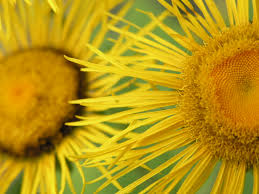Inula is a large genus of about 90 species of flowering plants in the family Asteraceae, native to Europe, Asia and Africa.
Contents
Uses
Elecampane is used for lung diseases including asthma, bronchitis, and whooping cough. It is also used to prevent coughing, especially coughing caused by tuberculosis; and as an expectorant to help loosen phlegm, so it can be coughed up more easily.
Other uses include improving stomach function; treating nausea and diarrhea; and killing worms that can live in the intestine. These worms include hookworm, roundworm, threadworm, and whipworm.
Some people use elecampane to promote sweating.
In foods and beverages, elecampane is used to provide flavor.
In other manufacturing processes, elecampane is used as a fragrance in cosmetics and soaps.
Benefits
Elecampane for Respiratory Ailments
During constricted breathing, the lining of the bronchial tubes become swollen and red, making it harder to breath. Inulin coats and soothes the lining of the bronchial passages and also acts as an expectorant to reduce and cleanse lungs of congestion.
Elecampane formulas are often used to relieve a cough. In, “Relaxant effects on tracheal and ileal smooth muscles of the guinea pig” by Reiter M. Brandt, it was noted that elecampane root has a relaxing effect on smooth tracheal muscle.
The plant’s bitter tonic properties stimulate the appetite and digestion, increasing the flow of bile, and can support a debilitated respiratory condition, particularly helpful following influenza or bronchitis.
John Gerard recommended elecampane for “the shortness of breath.”
According to Andrew Pacholyk, a graduate of the Master of Science of Traditional Oriental Medicine, elecampane root is used to support good lung health in individuals who are prone to asthma attacks.
Elecampane and Tuberculosis
Although elecampane is often discussed in conjunction with bronchitis and emphysema, it has traditionally been used to relieve symptoms of pulmonary tuberculosis and, according to recent American research on tuberculosis. Elecampane’s volatile oils stimulate circulation and the bronchi, bronchioles and nose; the saponins quicken expulsion of mucus from the lungs.
Cautions
Special Precautions & Warnings:
Pregnancy and breast-feeding: It’s LIKELY UNSAFE to take elecampane if you are pregnant or breast-feeding. Avoid use.
Allergy to ragweed and related plants: Elecampane may cause an allergic reaction in people who are sensitive to the Asteraceae/Compositae plant family. Members of this family include ragweed, chrysanthemums, marigolds, daisies, and many others. If you have allergies, be sure to check with yourhealthcare provider before taking elecampane.
Diabetes: There is some concern that elecampane may interfere with blood sugar control. If you have diabetes and use elecampane, monitor your blood sugar carefully.
High blood pressure or low blood pressure: There is some concern that elecampane might interfere with blood pressure control. If you have blood pressure problems and use elecampane, monitor your blood pressure carefully.
Surgery: Elecampane affects the central nervous system and can cause sleepiness. There is a concern that it might cause too much sleepiness if combined with anesthesia and other medications used during and after surgery. Stop using elecampane at least 2 weeks before a scheduled surgery.
Interactions
Sedative medications (CNS depressants) interacts with INULA
Elecampane might cause sleepiness and drowsiness. Medications that cause sleepiness are called sedatives. Taking elecampane along with sedative medications might cause too much sleepiness.
Some sedative medications include clonazepam (Klonopin), lorazepam (Ativan), phenobarbital (Donnatal), zolpidem (Ambien), and others.
Other names
Alant, Aster helenium, Aster officinalis, Aunée, Aunée Officinale, Elfdock, Elfwort, Enule Campagne, Grande Aunée, Helenio, Helenium grandiflorum, Horse-Elder, Horseheal, Indian Elecampane, Inula, Inula helenium, Inule Aulnée, Inule Aunée, Inule Hélénie, Œil-de-cheval, Scabwort, Velvet Dock, Wild Sunflower, Yellow Starwort
References
Source: WebMD, http://www.webmd.com/vitamins-supplements/ingredientmono-2-elecampane.aspx?activeingredientid=2&activeingredientname=elecampane
Inula, https://en.wikipedia.org/wiki/Inula
Globalhealincenter, http://www.globalhealingcenter.com/natural-health/lung-cleansing-benefits-elecampane/

